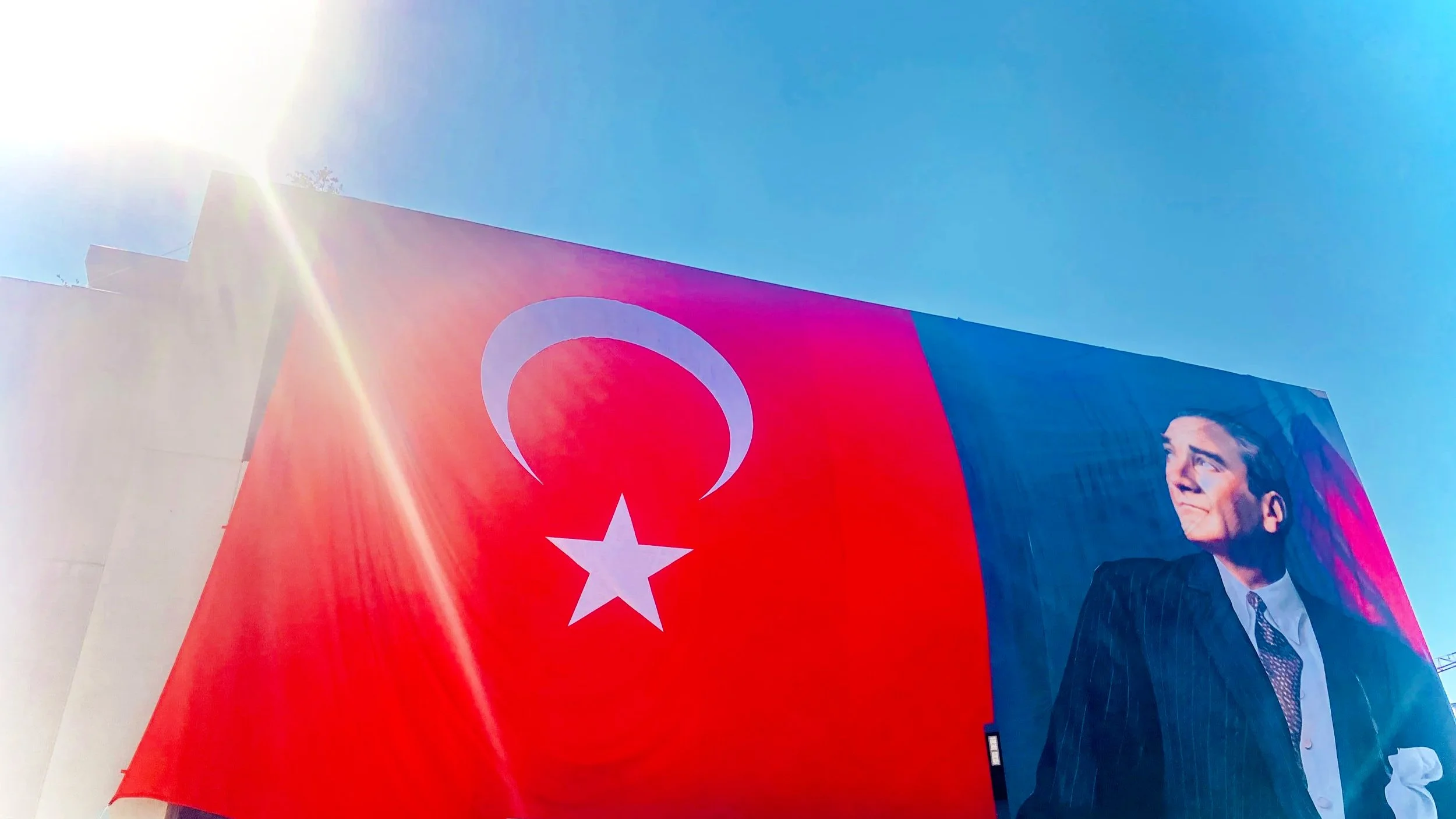the moon, the star and the blood.
30/08/2025
The sun, the moon and two stars. August 30rd at Galata Port. // Sonne, Mond und Sterne. Der 30. August 2025 am Galata Port.
Days of liberation.
(deutsche Version unten)
We Germans have a bit of an issue with ‘days of liberation’. After all, we had to liberate ourselves ‘from ourselves’. The “Tag der Befreiung vom Nationalsozialismus” on May 8th is neither a public holiday in our country, nor do we really dare to celebrate it. For rarely have catastrophe, trauma, shame and exuberant happiness been closer together than on this historic day.
And even our more recent ‘Day of Liberation’, the overcoming of the division of Germany, is celebrated with restraint or a shrug of the shoulders. It's cool when 3 October doesn't fall on a weekend: a long weekend in 2025! Yeah!
It's completely different here in Turkey. Today, on 30 August, I am part of the unmissable ‘Zafer Bayramı’ – Victory Day, the day of liberation from Greek occupation. Kemal Atatürk, the founder of modern Turkey, can be seen everywhere today: on cars, on houses, on billboards, on boats. And always in combination with the – as the designer must admit – graphically iconic symbolism of the crescent moon and star on a bright red background.
The crescent moon (Hilal), which, incidentally, has pre-Islamic, namely Turkish-Central Asian, Byzantine origins, stands for protection, hope and rebirth. In Turkey, the five-pointed star (Yıldız) stands for unity, order and the modern state. Both celestial bodies rest against a blood-red background – which (according to the story) Sultan Selim III introduced in 1793 as a reminder of the blood of Turkish martyrs.
As a German – I have described it – I have my theme with so much symbolism. History always (always!) wants to be told through many, many stories. Reinterpreting its heroes and symbols is an easy and popular game. We Germans have also had painful experience with this – and are doing it again.
So I wonder what the Greek narrative of this day sounds like, and I learn that Greeks lived in Western Anatolia for centuries. Perhaps they set their sights too high in the aftermath of the First World War. But 30 August 1922 was followed by waves of refugees, pogroms and destruction. Trauma, tragedy, loss of homeland and the end of centuries of cultural life for Greeks in Asia Minor.
If only peoples could learn to share land and culture with each other permanently and respectfully!
So I am full of respect for these people here, the people of Istanbul, their day, this country, this city.
But I am and remain sceptical. And I am allowed to be. I have to be.
** Incidentally, on the fourth anniversary of the surrender on 8 May 1949, the Basic Law of the Federal Republic of Germany was adopted in Bonn. The text begins with the words: ‘Human dignity shall be inviolable.’
//
Tage der Befreiung.
Mit „Tagen der Befreiung“ haben wir Deutschen ja so unser Thema. Wir mussten uns schließlich “von uns selbst” befreien. Den Tag der Befreiung vom Nationalsozialismus am 8. Mai ** ist weder ein gesetzlicher Feiertag bei uns, noch wagen wir ihn kaum wirklich zu feiern. Denn selten waren sich wohl Katastrophe, Trauma, Scham und Überschwang des Glücks näher als an diesem historischen Tag.
Und selbst unseren jüngeren „Tag der Befreiung“, die Überwindung der deutschen Teilung begehen wir eher zurückhaltend bis schulterzuckend. Cool, wenn der 3. Oktober nicht auf ein Wochenende fällt: ein langes Wochenende 2025! Yeah!
Ganz anders hier in der Türkei. Heute, am 30. August, bin ich Teil des unübersehbaren “Zafer Bayramı” – den Tag des Sieges, den Tag der Befreiung von der griechischen Besatzung. Kemal Atatürk, der Begründer der modernen Türkei, ist heute überall zu sehen: auf Autos, an Häusern, auf Plakatwänden, auf Booten. Und immer im Zusammenspiel mit der – wie der Gestalter in mir zugeben muss – allein grafisch geradzu ikonischen Symbolik von Mondsichel und Stern auf knallrotem Grund.
Die Mondsichel (Hilal), übrigens vorislamischer, nämlich türkisch-zentralasiatischer, byzantinischer Herkunft steht für Schutz, Hoffnung und Wiedergeburt. Der fünfzackige Stern (Yıldız) steht in der Türkei für Einheit, Ordnung und den modernen Staat. Beide Gestirne ruhen vor einem blutroten Hintergrund – den (der Erzählung nach) Sultan Selim III. 1793 einführte, als Erinnerung an das Blut türkischer Märthyrer.
Als Deutscher – ich habe es beschrieben – habe ich mein Thema mit soviel Symbolik. Geschichte will immer (immer!) aus vielen, sehr vielen Geschichten erzählt sein. Ihre Helden und Symbole umzudeuten ist ein leichtes und beliebtes Spiel. Auch damit haben wir Deutschen leidvoll Erfahrung gemacht – und machen es wieder.
So frage ich mich, wie die griechische Erzählung zu diesem Tag wohl klingt und ich erfahre: Jahrhunderte lang lebten Griechen in Westanatolien. Womöglich haben sie in der Folge des 1. Weltkriegs ihre Ansprüche zu hoch gestellt. Aber auf den 30. August 1922 folgten Fluchtbewegungen, Pogrome und Zerstörung. Trauma, Tragödie, Verlust von Heimat und das Ende eines über Jahrhunderte bestehenden kulturellen Lebens für Griechen in Kleinasien.
Wenn doch Völker nur lernen könnten, dauerhaft und respektvoll neben- und miteinander Land und Kultur zu teilen!
So bin ich voller Respekt, mit diesen Menschen hier, den Istanbulern, ihrem Tag, diesem Land, dieser Stadt.
Aber ich bin und bleibe skeptisch.
Und ich darf es sein.
Muss es sein.
** Am 4. Jahrestag der Kapitulation am 8. Mai 1949 wurde in Bonn übrigens das Grundgesetz der Bundesrepublik Deutschland verabschiedet. Der Text, der mit den Worten beginnt: „Die Würde des Menschen ist unantastbar”.
